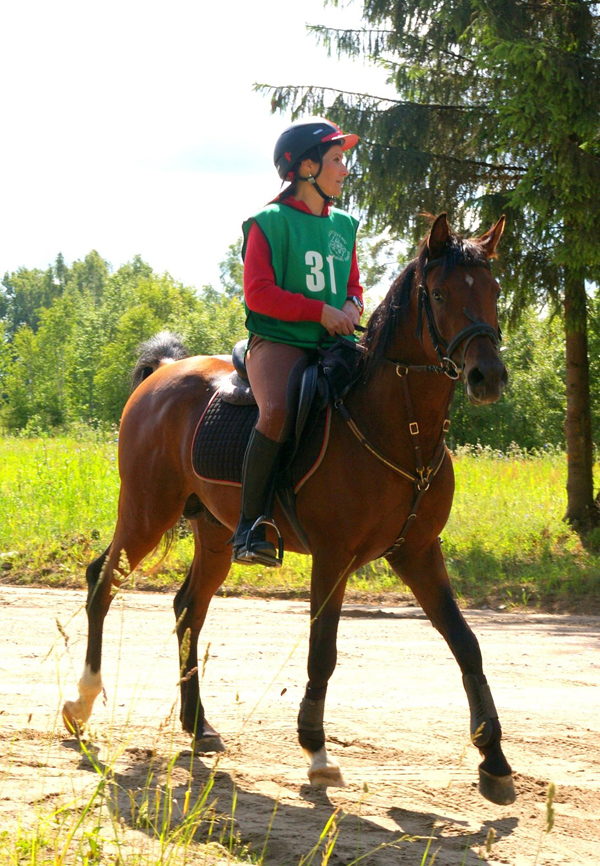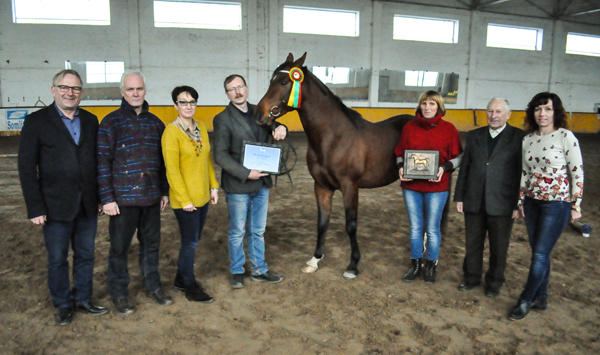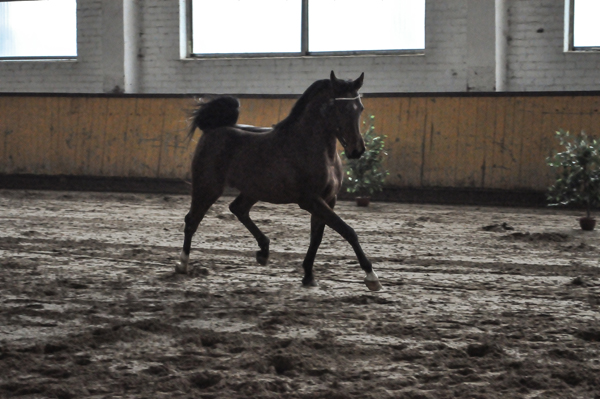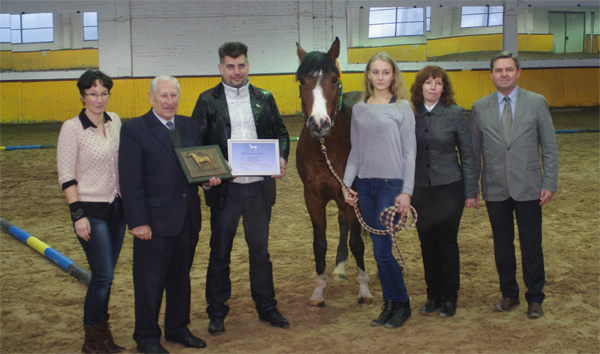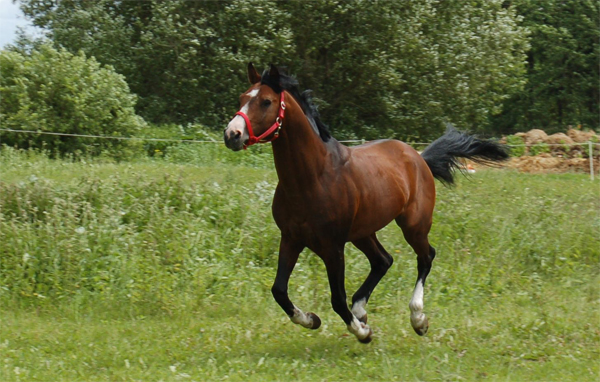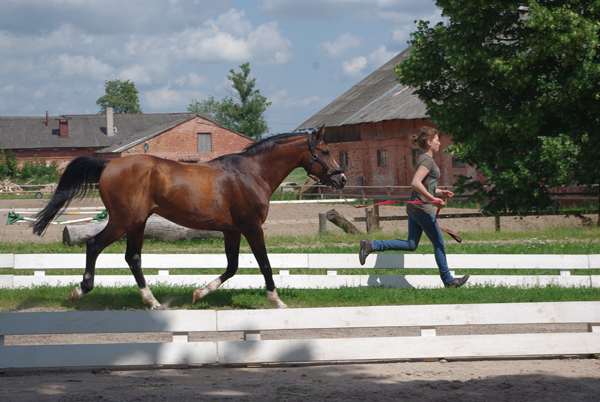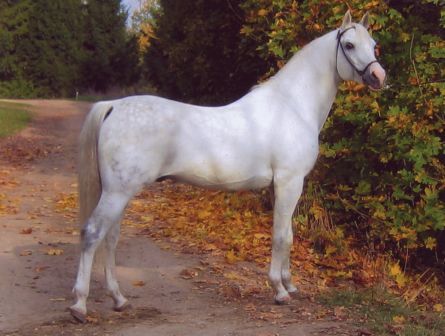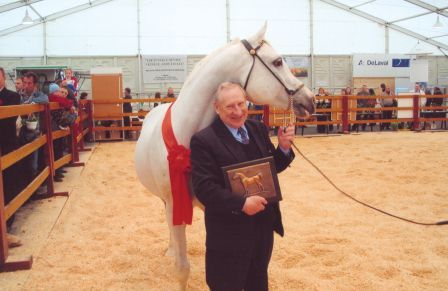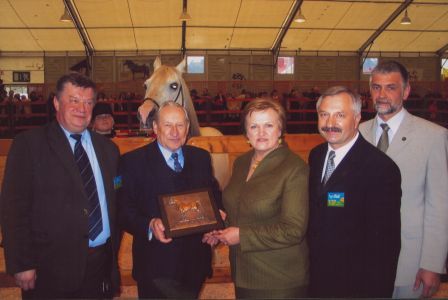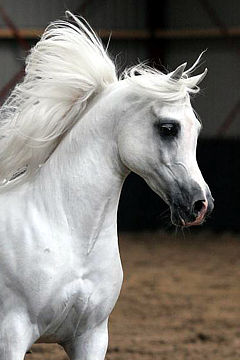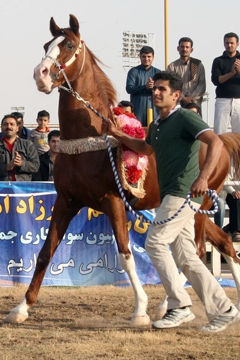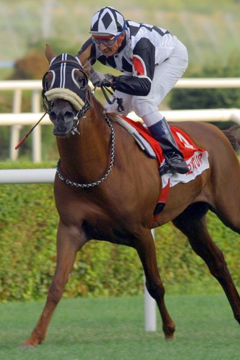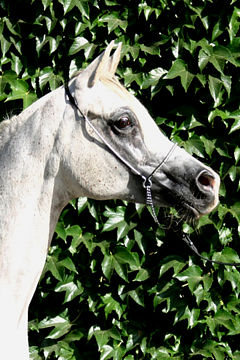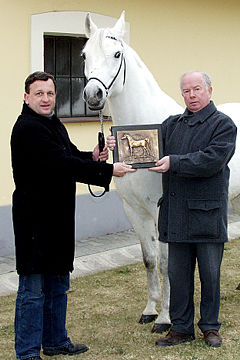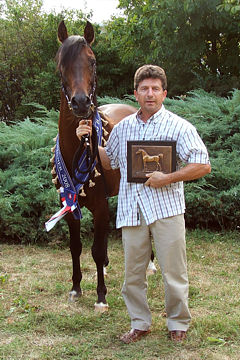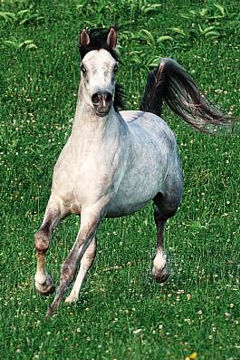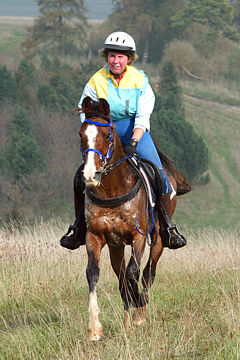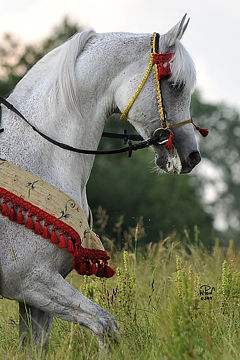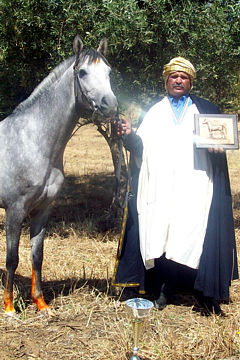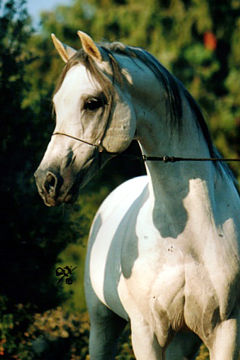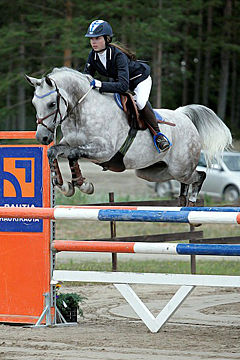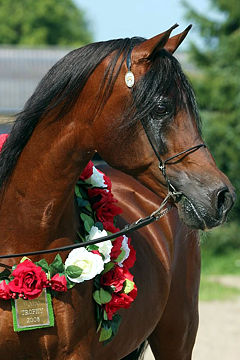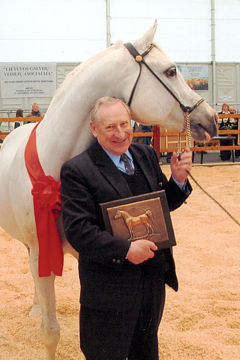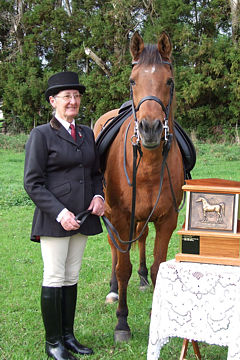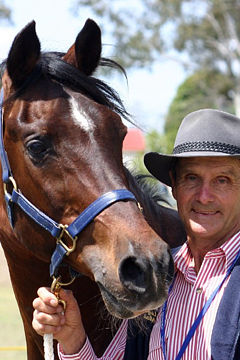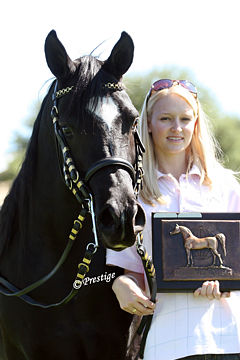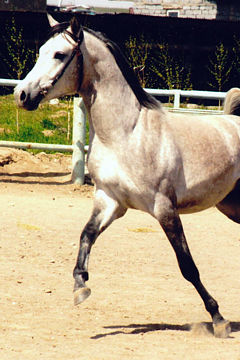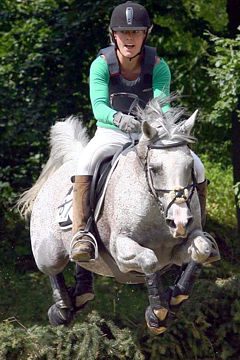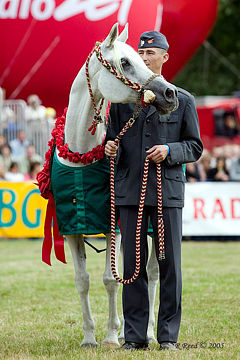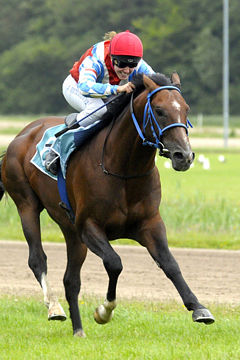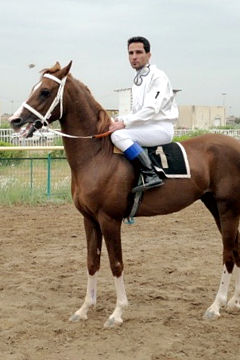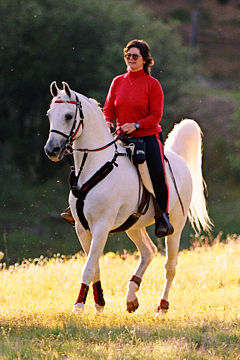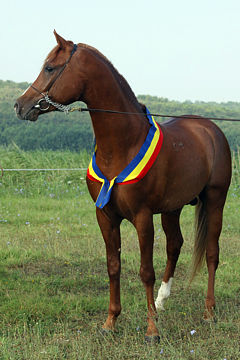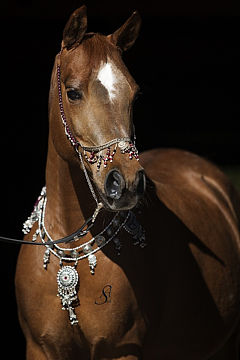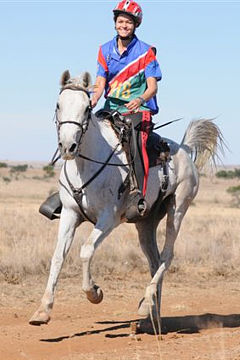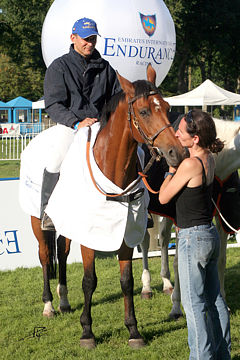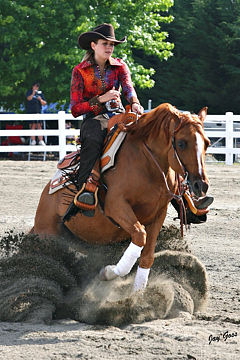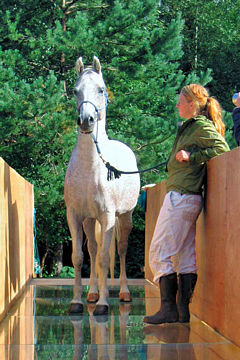![]()
Member Report from Lithuania
2019 REPORT:
The Lithuanian Arabian Horse Association has provided the following information. In 2018, 5 foals were registered. 5 horses were exported and 3 horses imported. There were 2 shows, 2 races and 6 endurance competitions. The current Stud Book volume 3 covers the period 2008-2016 and is available in .pdf format.
2017 REPORT:
The Lithuanian Arabian Horse Association has provided the following information. In 2016, 6 foals were registered, and 9 horses were exported. There were 2 shows, 3 races and 6 endurance competitions. In 2017 5 foals were registered, 8 horses were exported and 6 horses were imported. There was 1 show, 3 races and 3 endurance competitions. Show jumping is also a popular activity.
REPORT AT 2014 WAHO CONFERENCE:
Vaclovas Macijauskas, Lithuania: Mr. President, Members of the Executive Committee, Delegates, ladies and gentlemen. The Lithuanian Delegation in this Conference is represented by Mr. Stasys Svetlauskas, the President of The Lithuanian Arabian Horse Breeders Association, and myself, Vaclovas Macijauskas, a council member of this Association and a breeder of Arabian horses. First of all, we would like to thank the Qatar Racing and Equestrian Club for such good organization of this Conference.
Over the last 3 years the structure of Lithuanian horse breeding was a little bit changed. Up to this time the Arab horses were mainly raised in Vilnius stud, but now, when 3 stud farms were merged into one “Lithuanian stud”, the number of the Arab horses was reduced. Main part of Arab horses were sold to private horse breeders or exported. Only 36 Arab horses were left in Vilnius stud. The private horse breeders own 120 Arab horses. Lithuania also suspended subsidies for Arabian horse breeding in stud farms.
The Equestrian Federation of Lithuania is mostly running the sport events. In Dressage competitions permanently are participating about 5 Arabian horses, in endurance races about 6 horses and in international endurance competitions about 3 horses per year. Very good results were shown by the horses Azoras and especially Arta which was awarded the Best Condition prize. Show-competitions and other measures that are necessary to record a horse in the stud book are partially financed from the state budget in Lithuania. Such competitions are being organized 7 times per year including 1 Arabian horse show. In these Show competitions from 25 to 35 horses of various ages participate.
Arabian horses are very popular in our country. They are the pride of all agricultural exhibitions, especially of the international exhibition Agro Balt. At the time of these exhibitions many informal newsletters and booklets have been issued. Information about various events and achievements of horse breeders have been published in the newspapers and magazines. In 2011 the book “Arab Horse Breeding Review” was published in Lithuanian and English languages. The history of Arabian horse breeding and their achievements is discussed in the meetings, conferences, seminars and widely described in media. In Lithuania there are two specialized horse magazines and two agricultural newspapers where the articles about preservation, improvement and different activities of Arabian Horses are published frequently.
Lithuanian Arabian Horse breeders have warmly welcomed the establishment of the WAHO Trophy, because it was difficult to distinguish and honour the best Arabian horses before. This special award has also increased the interest and the competition among our Arabian horse breeders. The WAHO Trophy is usually presented to a carefully selected Arabian horse during the international exhibition Agro Balt or other significant horse shows. A representative of the Ministry of Agriculture, accompanied by many other respectful guests, usually presents the Trophy. This way the achievements of Arabian horses are presented not only to horse breeders and to thousands of spectators but also to stock-raising experts and the representatives of the Government. 6 times this award went to Arabian horses from Vilnius stud, and 2 times it came to the private horse owners. Two excellent stallions have been especially distinctive. They are Bosas, the winner of the WAHO Trophy in 2005, and Azoras, awarded in 2010. They both have been raised in Vilnius Stud. Azoras has started his carrier in racing, later he has become the winner in Three day event for youngsters, and starting with the year 2003 he has become the champion of Lithuania 4 times. In the international competitions he has got first and sixth placing. The progeny of both stallions has a very good working efficiency, excellent exterior and many other good features.
Arabian horse population in Lithuania is not big, however, due to their good characteristics they are widely used in sport and for improvement of the other breeds. In Lithuania it was a mandatory rule that all foals must be parent verified by blood-typing at first registration. Starting from the year 2014, we are using parent verification by DNA. In Lithuania there is no accredited laboratory for DNA tests, therefore we are using laboratories in Poland. Lithuanian Arabian horse breeders consider that the parent verification by DNA must be mandatory for all Arabian horses. This would help to avoid inaccuracies or even falsification of the pedigree. The Government of Lithuania does not regulate neither import nor export of the horses. Of course, all import and export procedures are supplied with all necessary documentation. Until this year we have still been printing the stud books, because the printed versions are more convenient and acceptable for senior horse breeders, but at the same time all our database is available online and on CDs. Thank you very much for your attention.
REPORT AT 2011 WAHO CONFERENCE:
Mrs. Inesa Petkivičienė, Lithuania: Mr. President, members of the Executive Committee, delegates, ladies and gentlemen. My name is Inesa Petkivičienė, I am a member of the Lithuanian delegation. Our voting delegates are Mr. Stasys Svetlauskas, the President of the Lithuanian Arabian Horse Breeders Association, and Mr. Vaclovas Macijauskas, a Council Member of this Association. In this Conference are also participating Mr. Aleksandras Muzikevičius, the Director of Vilnius Stud, Mrs. Nemira Stašienė, the Registrar, and Mr. Arūnas Svitojus, the Regional Director of the Baltic Foundation.
As a member of WAHO, Lithuania has always felt strong support in handling the registration and breeding of Arabian horses, as well as in organizing the shows and competitions. On behalf of all Arabian horse breeders of Lithuania we would like to thank you all for your assistance and kind support.
In 2010 Lithuania suspended its subsidies for Arabian horse breeding and this, together with the economic decline, has had a negative effect to the development of the Arabian horse breeding. As a result, the export and import of Arabian horses, which has never been significant, has also slightly decreased. The Arabian horse population in Lithuania is not big, however due to their good characteristics they are widely used in sport and for improvement of the other breeds. Since 1995 Arabians have been participating in the annual International Exhibition, Agro-Balt, showing the horses of this breed gives a lot of charm to this event. 8 Arabian horses participated in this year’s exhibition and were rewarded. During the 3 day event for young horses, the Arabians have surprised the audience with their speed and stamina. They have covered the racetrack faster than horses of the other breeds, that has surprised not only horse breeders but also the judges! Lately the endurance competitions organized by the Equestrian Sport Association have become more and more popular in Lithuania. During these competitions, Arabian horses are showing the best results. For several years we have been successfully organizing Arabian horse shows with judges invited from abroad. Mr. John Jessen from Germany was Senior Judge for a long time, later we invited an expert from Poland, Wladyslaw Guziuk. This event serves not only as a means for the horse evaluation, it is turning into the school for horse breeders and judges and it is also a promotion of the breed. Our horses participated in the Estonian Open Championships, where the stallion Suveniras was highly rated, he became the Champion of Estonia. Several horses owned by Lithuanian breeders are also participating in the international shows in Israel, and they have shown good results.
The Lithuanian Arabian Horse Association has been organizing different activities in order to improve the breeding of Arabians in the country. The Equestrian Federation of Lithuania and other similar organizations with a significant contribution of the Lithuanian Arabian Horse Association, are mostly running sport events, such as racing, show-jumping etcetera, for the purpose of exhibiting the sport qualities of these horses. Lithuanian Arabian horse breeders have warmly welcomed the establishment of the WAHO Trophy because it was difficult for us to distinguish and honour the best Arabian horses before this. This special award has also increased the interest in the competition among our Arabian horse breeders. The WAHO Trophy is usually granted to a carefully selected winner, and is presented in public during the International Exhibition, Agro-Balt, or at other significant horse shows. A representative of the Ministry of Agriculture, accompanied by many other respected guests, usually presents the Trophy. This way, the achievements of Arabian horses is presented not only to horse breeders and to thousands of spectators, but also to stock-raising experts and the representatives of the Government. This Trophy has been won 4 times by horses bred by Vilnius Stud and twice it has been awarded to horses belonging to private owners. Two excellent stallions have been especially distinctive, they are Bosas, the winner of the WAHO Trophy in 2005 and Azuras, awarded in 2010. They were both born and raised in Vilnius Stud. Azuras, born in 1995, started his career in racing, he won the 3-day event for young horses, and starting with the year 2003 he has been 4-times Lithuanian endurance Champion and has also taken a first and a 6th place in International Endurance events over 120 kms. The progeny of both these stallions have a very good working efficiency, excellent exterior and many other good features.
Arabian horses themselves are making the best promotion to their breed by taking part in different activities and showing excellent results. Their achievements are discussed in the meetings, conferences, seminars and widely described in the media. In Lithuania there are 2 specialized horse magazines, and 2 agricultural newspapers, where the articles about preservation, improvement and different activities for Arabian horses are published frequently. Due to their especially attractive appearance, the grace of their motion and achievements in various events, Arabian horses often appear in documentary films, chronicles, photo calendars and other public information sources that also have an educational function. Since joining WAHO, the Lithuanian Arabian Horse Breeders Association has published 2 studbooks and 2 supplements. We have the third volume ready, which will be published in 2012. We are still printing our studbooks, because the printed versions are more convenient and acceptable for senior horse breeders, but at the same time our database is available online and on CDs. Thank you for your attention.
REPORT MADE AT 2009 WAHO CONFERENCE:
Let me introduce our delegates. I am Laima Ciceniene, currently Chairman of the National Arabian Horse Breeders Association, with me are Mr. Stasys Svetlauskas who is the President of the National Arabian Horse Breeders Association, and Mr. Vaclovas Macijauskas, who is a council member of this Association. We would like to take this opportunity to thank you for the invitation to this WAHO Conference.
Lithuania has been a member of WAHO for 15 years, all this time we have felt your strong support in our organising and handling of the breeding and registration of Arabian Horses as well as shows and competitions. On behalf of the Ministry of Agriculture and the Arabian Horse Breeders Association, I would like to thank all the WAHO Members for their assistance and kind support. We also extend a special thanks to Dr. Hans Nagel, the President of WAHO and Katrina Murray, the Executive Secretary.
In the first Lithuanian Arabian stud book, which was published in 1995, there were 118 registered horses. We have published two supplements and this year we will publish Volume 2 which covers the full period from 1995 to 2007. 233 Arabian horses have been registered. 13 foals were born in 2007 and 12 in 2008, but due to the rising demand for Arabian horses we are now seeing an increase in the number of mares which have been covered. Currently there are 136 living purebred Arabian horses in Lithuania, of which 8 are active breeding stallions and 30 broodmares. During the reporting period, we imported 2 horses from Israel and Egypt. This will enable us to improve the genetic pool of our Arabians in Lithuania. In 2007 we exported 1 horse to Estonia, 1 to Poland and 1 to Germany. In 2008 we exported 2 Arabians.
As a mandatory rule, we are using blood-typing for parent verification before first registration of foals, this is obligatory. Some of the foals are parent verified by DNA typing. The laboratory of the National Food and Veterinary Risk Assessment Institute is verifying parentage. For the meantime we are using freeze marking for purebred Arabian horses, microchipping will be used starting from July 2009 and will be applied to all horse breeds in Lithuania. The Vilnius State Stud, which is located near to the capital city of Vilnius, has opened an Artificial Insemination Centre which offers semen collection and insemination services to our breeders. The Centre is also working as a laboratory for freezing semen, where frozen semen from the best stallions is stored. Due to low demand and a small population of horse breeds, we do not use Embryo Transfer in practice, but this method is allowed in Lithuania and is widely practiced especially in cattle breeding.
In Lithuania the Stock Breeding and Exhibition Horse Shows are very popular. At our International Exhibition, AgroBalt, Arabians always have great success. Two horses belonging to Lithuanian owners participated in the International Shows at the Egyptian Event Israel 2007 and 2008, one of them took the Reserve Championship in both those years, the other was the Reserve Junior Champion filly at this show in 2008. In recent years Arabian racing has become more popular in Lithuania, Arabians also participate in the events open to all other breeds. Arabians are especially popular in endurance riding, where they are the leading breed. This year an International endurance ride will be held in Lithuania.
Horse breeding in Lithuania has state support, three stud farms which have the best breeding stock get state subsidies. There are 2 types of passport used in Lithuania, the FEI passport and that issued by the Ministry of Agriculture. The establishment of the WAHO Trophy increased the interest and competition among our Arabian horse breeders. The winner has usually been selected during the main show, also taking into account their input into the Arabian breed. The WAHO Trophies have been officially presented during the National Exhibitions or Horse Shows. In 2008 the WAHO Trophy was won by the mare Palanga.
After receiving our independence and joining WAHO, the great opportunity arose for us to cooperate with horse breeders from other countries with a very positive influence on the quality of the Arabian horses in Lithuania. Thank you for your attention.
REPORT MADE AT 2007 WAHO CONFERENCE:
Lithuania has been a Member of WAHO for 14 years. In the first stud book of Arabian horses that was published in Lithuania in 1995, there were 118 horses registered. In the first supplement to the first volume, which covers the period 1995 to 1998, 53 horses were registered. In the second supplement to the first volume, which covers the period 1999 to 2002, 63 horses were registered. Volume 2 of our Stud Book will be ready and will be published and distributed at the end of 2007.
10 foals were born in 2005, and 16 in 2006. In recent years due to the poor demand for Arabian horses, some of the mares were not covered. At present this demand is rising, therefore all the mares will be covered. Accordingly the number of foals and Arabian horses in general will increase. Currently there are 121 purebred Arabian horses in Lithuania, of that number there are 8 stallions and 28 mares used for breeding. For the current breeding season we have leased the stallion Grafik from Michalow Stud in Poland. During the reporting period, we have imported 9 Arabian horses from Israel and 1 from Poland. We want to improve the genetic foundation of Arabian horses in Lithuania, using imported horses with good characteristics. In 2005 we exported 7 horses to Finland, 1 to Estonia, 1 to France. In 2006 we exported 2 to Poland and 5 to Estonia.
13 foals were registered in 2007.
As a mandatory rule, we are using blood-typing for parent verification before first registration for foals. Starting from this year, the accredited Lithuanian National Veterinary Laboratory will also be verifying parentage by DNA. We are using freeze marking of purebred Arabian horses. Microchipping will be used in the future and will be applied to all horse breeds in Lithuania. Starting from this year, we mostly use Artificial Insemination for purebred Arabian mares, we have an accredited insemination centre.
In the Lithuanian Stockbreeding Exhibitions, showing horses is very popular. Arabian horses have a special attention for their grace, elegance and lightness of movement. In the annual International Exhibition Agro-Balt, Arabians have a great success. Races for Arabians have recently become more popular, they are held 5 times per year. Also especially endurance is popular, events are held 3 times per year. Lithuanians have loved horses since ancient times, even the national State Coat of Arms has the image of the horse. All popular activities for horses, such as racing, showing, and the others, get full media coverage. During the Exhibitions, we prepare booklets about every represented breed. All this generates interest in horses. The Lithuanian Government promotes horse breeding and the three State Stud farms that have the best breeding material get state subsidies. State support is also given to purchase purebred horses to stand at stud. The Government promotes farmers who are breeding horses and participating in breeding programmes. Unfortunately, directives of the European Union don’t recommend this kind of support, this will have a negative impact on our horse breeding in the future. The European Union encourages the maintenance of national and rare breeds only. State subsidies and support for rare breed horse breeders has a very positive impact, and now we have 64,000 horses in a relatively small country such as Lithuania.
After Lithuania regained its independence and joined WAHO, the great opportunity arises to co-operate with horse breeders from other countries, with a very positive influence on the quality in Lithuanian Arabian horse breeding.

